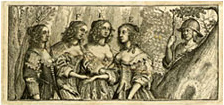Abraham Fraunce, The Lawyer's Logic (1588)
Full Text
Not available
EEBO/TCP
Not available
Date
1588
Author
Abraham France (alternate name for Abraham Fraunce ) Note: 30/09/2005
Book title
The Lawiers Logike, exemplifying the præcepts of Logike by the practise of the common Lawe
Publication place
London
Printer
William How
Publisher
Thomas Gubbin and T. Newman
Transcription source
EEBO/TCP (University of Chicago Library)
Text type
printed book
Genre
Treatises
Subject area
- law
- logic
Word-group
type: undifferentiated
Word-entry
type: logical
sample: A Definition is that which declareth what a thing is: it consisteth on two parts, the generall and the difference. Whereof the first is common to the thing defined, and all his other fellow specials, but the difference is proper onely to the thing defined, and distinguisheth it from all other his fellow specials. A definition is perfect or vnperfect; whereof the first, for the excellency, is called definition by the common name: the second is tearmed a description, by a more speciall tytle or woord. A perfect description is that, whose difference is fet from the formall cause of the thing defined, as, A man is a sensible creature endued with reason, where, sensible creature is the generall, and endued with reason, is the difference: so that whatsoeuer is in a definition placed after the generall, that I call in this place the difference. (p. 60)
sample: A Definition is that which declareth what a thing is: it consisteth on two parts, the generall and the difference. Whereof the first is common to the thing defined, and all his other fellow specials, but the difference is proper onely to the thing defined, and distinguisheth it from all other his fellow specials. A definition is perfect or vnperfect; whereof the first, for the excellency, is called definition by the common name: the second is tearmed a description, by a more speciall tytle or woord. A perfect description is that, whose difference is fet from the formall cause of the thing defined, as, A man is a sensible creature endued with reason, where, sensible creature is the generall, and endued with reason, is the difference: so that whatsoeuer is in a definition placed after the generall, that I call in this place the difference. (p. 60)
Alston
V.19
STC
11344
Other editions
1588: STC 11343, -45 (Alston V.20-21)
Facsimiles
Fraunce, Abraham. The Lawyer's Logic, 1588. English linguistics, 1500-1800, no. 174. Menston: Scolar Press, 1969. view record




